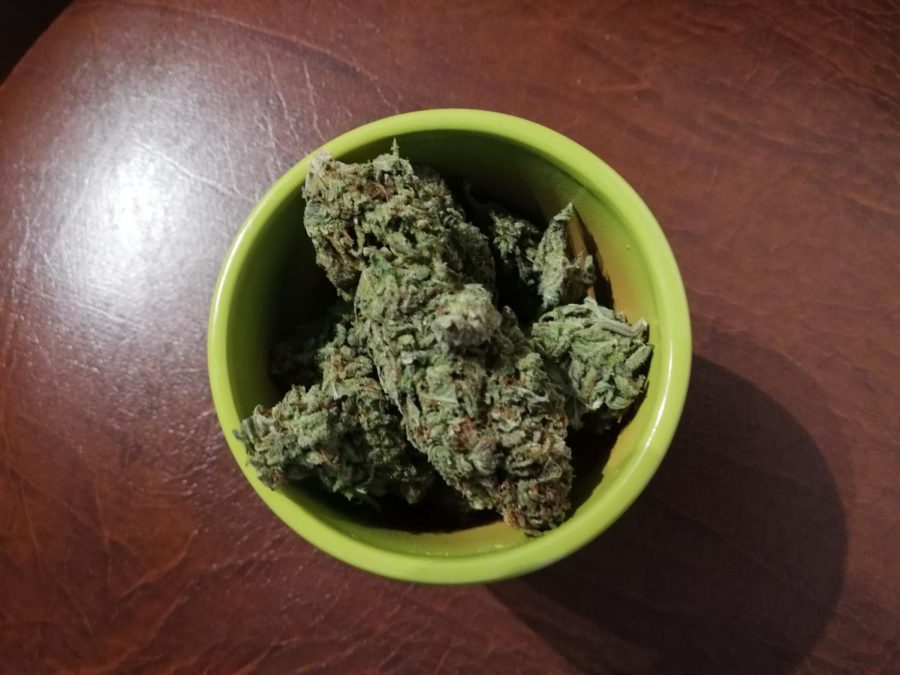What Wisconsinites need to know about marijuana legalization in neighboring states
Courtesy of Efiks, CC BY-SA 4.0 via Wikimedia Commons — While neighboring states may have legalized recreational use of marijuana, it is still illegal in Wisconsin. In Wisconsin, the first possession of any amount of marijuana is treated as a misdemeanor, punishable by up to six months in jail and a $1,000 fine.
June 15, 2023
Over the last decade, laws regarding recreational marijuana possession and consumption have changed drastically nationwide. Prior to 2012, recreational marijuana possession or consumption was illegal across all 50 states. As of the writing of this article, 23 states have fully legalized recreational marijuana, most recently neighboring Minnesota.
Wisconsin marijuana history
In Wisconsin, possession, consumption, and the sale of marijuana, even for medicinal purposes, is illegal. Cannabidiol oils, better known as “CBD,” are legal in Wisconsin for medicinal purposes so long as they are “Low-THC” products.”
Low-THC products are products with no more than 0.3% delta-9-THC. Delta-9-THC is the psycho-active ingredient in marijuana. Although some cities in Wisconsin have decriminalized marijuana, state laws trump those local ordinances. For example, in Milwaukee, the first possession of a small amount of marijuana, which is 25 grams or less, results in a fine of $1.
Potential penalties
In Wisconsin, the first possession of any amount of marijuana is treated as a misdemeanor, punishable by up to six months in jail and a $1,000 fine. A law enforcement officer or district attorney has the discretion to issue an ordinance violation for the possession of marijuana rather than a criminal charge. The punishment for an ordinance violation includes a monetary fine and does not result in a criminal conviction.
A second state conviction for marijuana possession, regardless of amount, or coupled with a previous drug conviction, regardless of the type, is a felony in Wisconsin, punishable by up to 3 ½ years imprisonment and a $10,000 fine. Depending on the amount of marijuana and other circumstances, possession of marijuana can turn into possession with intent to distribute, which is a felony also punishable by up to 3 ½ years imprisonment and a fine of up to $10,000.
Recreational marijuana laws in neighboring states
A recent analysis from the Wisconsin Policy Forum called “Changing Midwest Marijuana Landscape Impacts Wisconsin” found that half of all Wisconsinites over 21 can drive an hour and half from their homes to legally purchase recreational marijuana in a nearby state. The states adjacent to Wisconsin with recreational marijuana include Illinois, Michigan, and Minnesota.
Illinois: Adult out-of-state residents, age 21 and over, may purchase 15 grams of marijuana, 2 ½ grams of marijuana concentrates, and 250 milligrams of marijuana-infused products for recreational use while visiting the state. (Residents may purchase up to two times these amounts.) Marijuana may only be consumed on private property where no bystanders can observe. It is illegal to use marijuana in:
- public places like parks,
- federally owned properties,
- within a vehicle, even if parked, and
- in front of a minor (under 21).
Michigan: Recreational marijuana is legal and available for purchase by out-of-state residents age 21 or older. It is legal to possess up to 2.5 ounces in public and up to 15 grams of marijuana concentrate. Michigan laws require marijuana consumption to occur in a private residence or the home of someone, with resident permission. It’s illegal to consume marijuana on federal property, in a vehicle, or in public or in public view, with an exception for some designated locations within some municipalities.
Minnesota: Minnesota recently legalized recreational marijuana on May 30, 2023. As of August 1, 2023, Minnesota residents will be permitted to consume and grow marijuana in their homes. Possession of marijuana will be limited to 2 pounds, or approximately 70.5 ounces, at their residence and 2 ounces, or approximately 56 grams, in public. Marijuana will be permitted to be at Minnesotan’s private residence, another’s private property who permits it, and businesses or events licensed for on-site consumption. Such consumption will be prohibited on federal property, within a vehicle, or public places, including private residences in public view such as balconies or patios of apartment and condo buildings.
Legal Takeaways
- Fines are possible: It is important to remember that, even within states with legal marijuana, the violation of marijuana consumption or possession laws can lead to additional fines and other possible criminal sanctions.
- Driving: The operation of a motor vehicle after consuming marijuana is illegal in all states and can lead to charges like operating while intoxicated or with a restricted controlled substance, which ranges in penalties from fines to prison sentences with mandatory minimum periods of incarceration.
- Transporting marijuana: If you purchased marijuana legally in another state, it is illegal to transport it across state lines – even if you are crossing into another state where marijuana is legal. It is a federal crime to transport marijuana across state lines.
Marijuana is classified as a Schedule I drug, according to the Controlled Substances Act, a federal law that, in part, prohibits the possession or consumption of marijuana, which trumps any state laws that say otherwise. Though federal law may apply, it may not be enforced, especially in states in which marijuana is legal.
This article is courtesy of the WNA Foundation and is written by Michael A. Forella III. Know Your Legal Rights is a bi-monthly column distributed by the State Bar of Wisconsin. It is written by members of the State Bar of Wisconsin’s Lawyer Referral and Information Service (LRIS), which connects Wisconsin residents with lawyers throughout the state.














